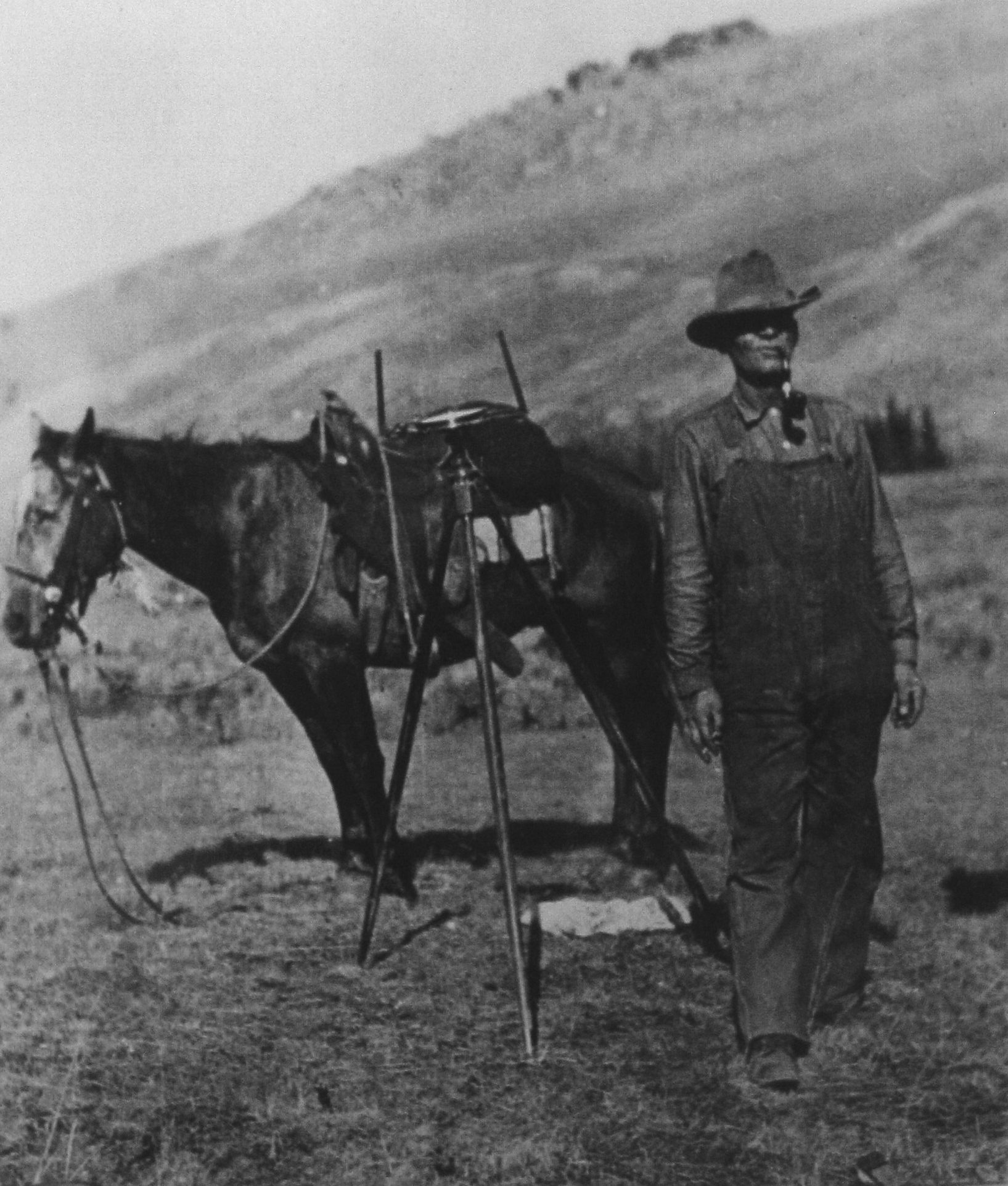(Contributed by the Thomas Tolman Family Organization. Excerpt from Judson Tolman: Pioneer, Lumberman, Patriarch by E. Dennis Tolman, Second Edition, 2004, pages 149-151).
Little John Tolman was born in Eureka, Utah September 8, 1861, to Cyrus and Margaret Eliza Utley Tolman. His sister described him as more of a homebody. He never worked much in the mines. He never had but one month of schooling in his life. He could write his name and was very good at figures. He knew how to managed his affairs and was a good provider. He made sure his children had plenty to eat and good clothes to wear. He always wanted the best for his children, but didn’t want them to grow up without knowing how to work and the value of the dollar.
Little John married Jane Huntsman, daughter of Isaiah and Emma Melissa King Huntsman, December 25,1885 and moved to Star Valley to make their home. Jane was attractive, had a beautiful singing voice and was a member of the Fairview Choir. John homesteaded farms, owned a place over on the west hill and the land down below the road by Crow Creek. Seven children were born to them: Margaret Emma (September 23,1889),Wilford Milton (October 12,1892), Madeline (November 29,1994), LaPrele (March 28,1898), Mondell (May 19,1901), Jane(August 16, 1902) and Alice (August 21, 1905). Little John was a good, but strict father. He never allow his children to talk back. He always taught them to be honest and abhor liars. He would rather have seen his children dead than have them lose their virtue.
Little John was a very ambitious and hard working man. He believed in the old saying “Early to bed and early to rise makes a man healthy, wealthy and wise.” Breakfast was always at 7:00, dinner at 12:00 and supper at 6:00. Meals had to be on time. He was the first mail carrier in Fairview and carried the mail on horse back from Montpelier 50 miles in the summer. In the winter he carried it on snow-shoes. He loved children, especially boys. He always said that he wouldn’t give 2 cents for a boy that wasn’t mischievous. He loved to dance. In his younger days he won several prizes for the waltz.
He seldom found time to attend church as he had a large cattle ranch with much to do. He insisted that his children attend Church. He always paid his tithing and was one of the first to pay extra, generous donations. He was good to widows and orphans, always doing some kindness for them. When the Fairview Church House was built, he furnished all the nails.
Mondell Tolman shared the following about his father: “I talked to President Osmond one time as I met him on a street in Afton. He said he really thought the world of dad. He told me that dad had always paid his tithing but he didn’t want any one to know about it. President Osmond also told me that dad gave generously to the poor and the needy and especially to the widows or anyone who was in trouble. A friend got mixed up with one of them Raleigh deals and dad had to pay about a thousand dollars to square the deal….dad pulled friends and neighbors out of the trouble they would get themselves into….President Osmond said dad was always ready and willing to help the ward with the purchase of baseball uniforms or band instruments, etc. He seemed to feel it was his privilege to see to it that nobody took advantage of anyone who was unable to take care of themselves.
“One day Dan Lynch, President of the Afton Bank, told me that he knew quite a few people who had come to the bank asking for a loan without the collateral nor the credit to qualify. He would send them to dad and dad would often be able to help them out. He was a good judge of character.
One hard winter when hay jumped from five dollars to twenty-five dollars a ton. John had more hay than most anyone around there. Big cattlemen came and offered him twenty-five dollars a ton for all he could spare. John refused them, but he let any poor old fellow with one or two cows and no money, have the hay, and even allowed them to pay it back to him the next year or never if they couldn’t. He hauled the hay to the places of widows to save their cows. That was John’s religion.
In 1906, Jane died of cancer leaving him with seven children. She was eight months pregnant at the time. The baby was buried in her arms. He never took his clothes off for several days and nights after she was buried. He would walk around the farm for hours until he was exhausted then sit for hours with his face in his hands. He had quite a time getting anyone to take care of the children. He had a series of hired girls for a while. I especially remember one hired girl named Nicolena. She was from Sweden and didn’t know much about American cooking, and we couldn’t understand her very well.
He finally placed an ad in the newspaper for another housekeeper. Laura Victoria Peeples Vail answered the ad. He went to Montpelier to fetch her at the train station. To his surprise there she stood with luggage, boxes, and four children. She told him that she would not come and be his housekeeper unless he married her. He always had a soft heart for the widows and orphans…so he married her May 2, 1910 in Paris, Idaho and took her and her four children home with him. She was the daughter of William Calvin and Laura Grace Brown Peeples. She bore John six more children: Little Ornett (January 27, 1911), George C. (January 1913), Corwin Delos (April 5, 1914), Little Jack Aaron (February 16, 1915), Vincent (April 30, 1917) and Laura Victoria (April 6, 1918).
He was in the cattle business most of his life. He made most of his money speculating. For a time, besides his cattle business, he and his brother were in the sheep business. Once they had a meat wagon and would go from town to town selling fresh meat. John went to Chicago to ship cattle and brought home the first phonograph in the valley. People would come for miles to hear it. He was the first in Fairview to have the water piped into the house and have a modern bathroom. He also owned the first car in Fairview and one of the first in Star Valley. John had the first telephone in Fairview as well, and he never did get used to using it. He would holler into it so loudly that anyone in Fairview could have heard him without the phone! Because of the party lines, every time the phone would ring the other receivers clicked also, because people wanted to hear everyone else’s latest news.
John had a friendship with a known outlaw, Butch Cassidy. His real name was Elmer Jensen, the son of a Bishop in the small town of Manila, Utah. The real Cassidy was working for the Bishop and was rustling cattle and stealing whatever came handy on the side. Young Jensen fell in with him. They were chased by a posse. A posse member was killed and Cassidy and the Jensen boy got away. Cassidy died from gunshot wounds a few days later, near Flaming Gorge, Utah. Elmer Jensen took the name of Cassidy so as not to shame his family.
Two men there in Fairview were trying to change the brand on one of John’s animals. They botched it up so bad that they went home and got a flat iron and tried to iron out the brand. Then they smear it so bad that they finally had to butcher the critter, wrapped the hide up and tied it tight with barbed wire, and sank it in a deep hole in Crow Creek.
John had a big heart a quick temper—especially before he quit drinking. A lot of folks never knew he quit about three years before he died. Dr. West told him that if he didn’t quit he wouldn’t last a year. He also told John that he needed to taper off but doubted that he could withstand the trauma. John told him that if he had been fool enough to get himself into such a condition he would rather die quitting as he knew he would never be able to taper off.
John quit suddenly, but he suffered for about four months, walking the floor from ten at night until the morning. A few times he saddled his horse and rode into Afton to get a drink but always came back without taking one. This went on every day for almost four months but when the withdrawal period was over he was an entirely new man. It would have been well to have done it 25 years earlier.
John had a good relationship with President Osmond. A resident of Fairview had taken two of his daughters to Yellowstone Park. When they came home the girls were both pregnant by their dad. John and a dozen others were going to lynch the man. They were all ready when President Osmond found out and talked to John and some of the others and persuaded them not to do it. Instead of a lynching party, they had a tar-and-feather party. They carried him up Crow Creek on a rail, turned him loose, and warned him never to return to Star Valley. President Osmond was one of the first president of the Star Valley Stake. John was always grateful to him for saving him from committing murder.
In 1918 John had gone to Omaha to take a load of cattle to sell and when he came home he was stricken with the flu during the great flu epidemic. His wife, Victoria, was expecting another child, besides taking care of a whole houseful of children. No one in the family got the flu from John because they were all so careful. Victoria would wrap a dishtowel soaked in formaldehyde around her head and across her face when she would go in to take care of him. When his illness turned to pneumonia they could see there wasn’t much chance for him. He was determined he wouldn’t stay in bed and died October 21 at the age of 54 years while being held up on his feet by his son, Mondell, and a son-in-law. He was buried in the Fairview cemetery.
Visit FamilySearch to learn more about Little John Tolman and other ancestors. Also visit the Thomas Tolman Family Organization to find out how you can get more involved in family history.


